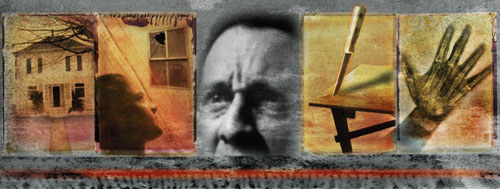

|
 Cover photo by Gary Samson 
|

Safe at Home? By Elibet Moore Chase '81 See also: Sociologist Murray Straus stood on one side of a one-way mirror. On the other side was a family--father, mother and 12-year-old son--who had volunteered to participate in his study of the various ways families deal with conflict. The experiment was set up like a game, something like shuffleboard, using balls and pushers of different colors. To gain points, the family had to work together to figure out the rules. With the researchers out of the room, the family tackled its task. The father worked aggressively, and within 20 seconds it was clear that he knew the rules. His wife and son were still struggling. "You gotta match the colors, dummy," he barked at his wife. And then he kicked her. Even though this was a study of how families deal with problems, it didn't occur to me at the time that violence is one method," Straus observes. Not until a few years later, in 1968, when Straus was in his first year of teaching sociology at the University of New Hampshire, did it occur to him that violence is not an anomaly in American family life, but a common part of it. "I conducted a survey in class and found that one-fourth of my students had been hit by their parents during their senior year in high school," says Straus. "I was startled. I had thought that corporal punishment was used only with little kids." The realization that behavior within families often includes some degree of violence prompted Straus to wonder if this could be related to the societal violence of the time: the Vietnam War, political assassinations, the Los Angeles riots, the rising rate of violent crime. He began to reflect on the man's kick as an indication of the violence in American culture, violence that needed to be studied if it were ever to be understood and changed. In the 30 years since, Straus has dedicated himself to the study of family violence and its relationship to violence in the larger society, and his work has become the cornerstone for a whole new field of sociology. His research is changing the way parents, educators, social workers, police and lawmakers look at the "ordinary" violence that takes place in our homes, schools and neighborhoods every day.
The Family Research Lab The Family Research Lab's 12 staff members are both researchers and teachers, educating not only students but also the public in general about the extent and effects of family violence. Because of the breadth of research methods used--surveys, analyses, interviews--their work has received global acclaim for its credibility. Their findings are used not only by other academics, but also in the public education system and to inform public policy in Congress and state legislatures. Straus has written or co-written 20 books and published more than 200 papers. He has been a mentor for more than 75 graduate, doctoral and post-doctoral students who have gone on to conduct research in the field. "Under Murray's leadership," states Texas Christian University sociologist Jean Giles-Sims '73, '76G, a former Straus student, "so many were trained, mentored and encouraged. That model of research has produced an enormous body of literature." Indeed it has: nearly three dozen books and more than 550 papers. In sociological circles, Straus and his colleagues and students are known as the New Hampshire School. Their collective work has led them to several general conclusions. They believe that conflict is universal, and there is no single cause of violence in the home; that the various forms of family problems are interrelated, both within the home and in society; and that much of the conflict and violence in society at large can be traced to roots in the family. Tackling Taboos blog comments powered by Disqus Current issue | Past issues | Class notes Department archives | Send a letter/news | Address updates Advertise | About UNH Magazine | Alumni home | UNH home University of New Hampshire Alumni Association 9 Edgewood Road Durham NH 03824 (603) 862-2040 alumni@unh.edu |